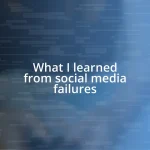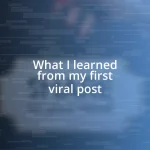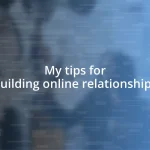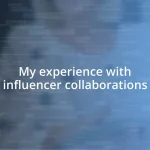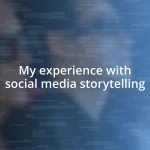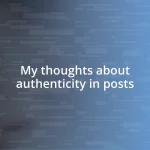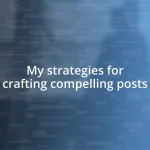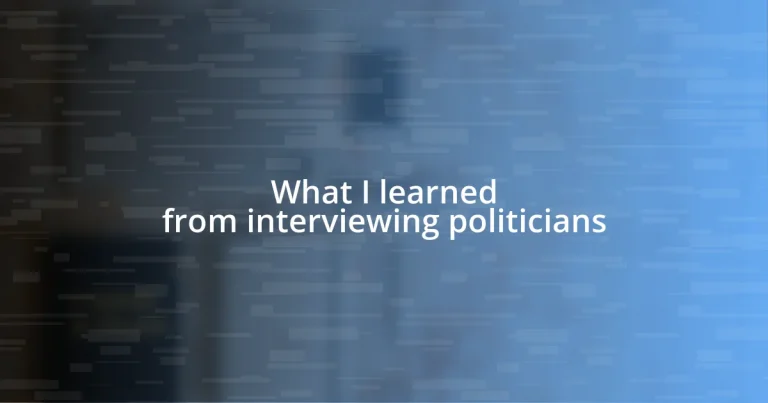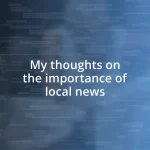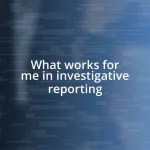Key takeaways:
- Thorough research and understanding a politician’s background are crucial for conducting insightful interviews that foster meaningful dialogue.
- Utilizing effective questioning techniques, such as open-ended questions and empathetic listening, helps uncover deeper motivations and narratives behind political decisions.
- Post-interview reflection, including evaluating emotions and personal performance, enhances future interviewing skills and leads to more authentic interactions.
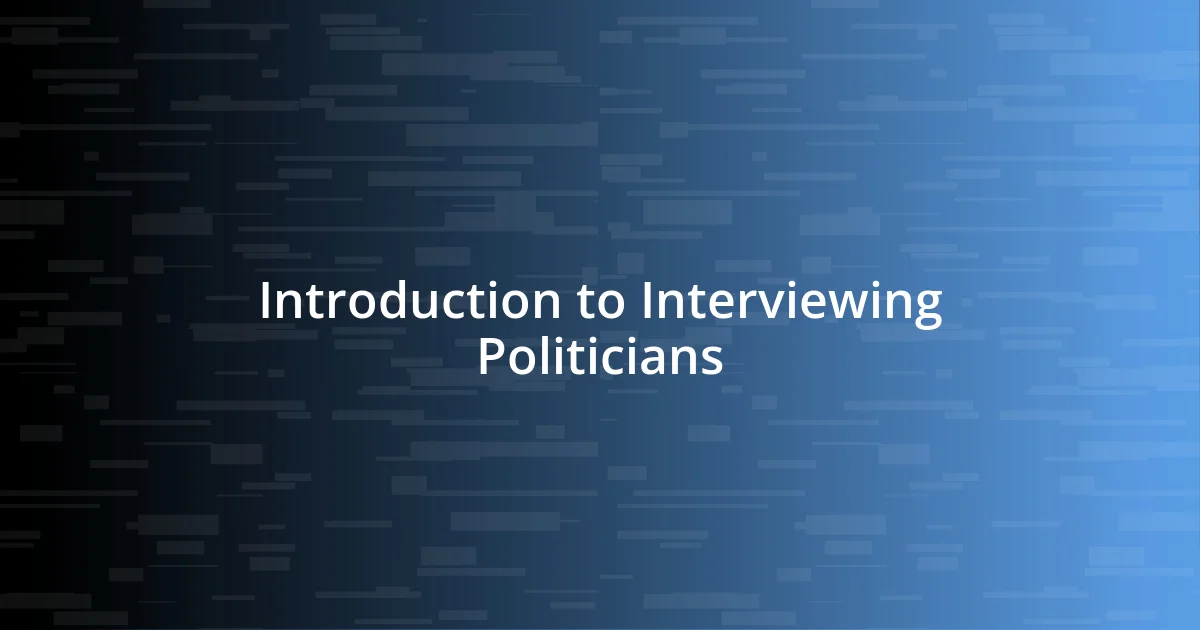
Introduction to Interviewing Politicians
Interviewing politicians can feel like stepping into a whirlwind of opinions, promises, and intricacies. I vividly remember my first interview; the mix of excitement and nerves was palpable. Watching them speak with conviction, I realized that these moments could significantly influence public perception and trust.
As I navigated the complexities of political conversations, I realized they aren’t just about facts and figures, but about connection. Each politician carries their own story, representing not only their party but also the hopes and concerns of their constituents. Doesn’t that make you wonder how much personal experience shapes their policies?
Engaging with politicians often reveals the human side of politics, which can be surprisingly enlightening. I found that a simple question could lead to unexpected revelations, showing me the delicate balance between public persona and private motivations. How often do we get a glimpse behind the curtain? Each interview became a reminder that politics is as much about individuals and their journeys as it is about legislation and governance.
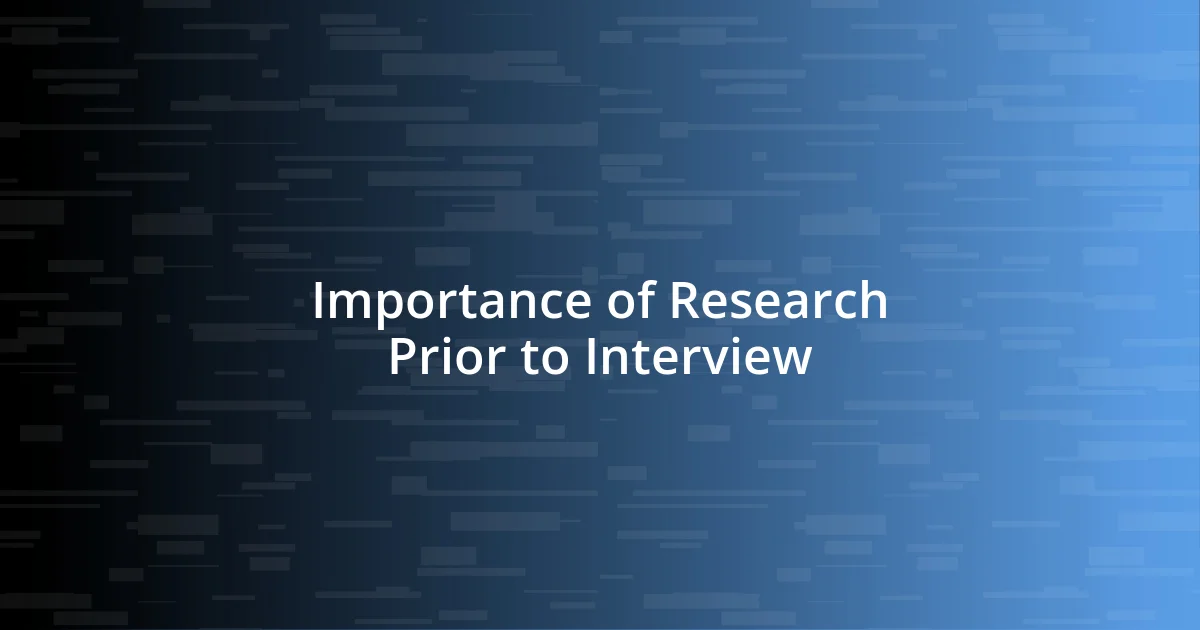
Importance of Research Prior to Interview
Before sitting down for an interview with a politician, I’ve learned that thorough research can make or break the conversation. I once walked into an interview without knowing much about my subject’s recent legislative actions, and it quickly became apparent that my questions fell flat. When I was equipped with context—like understanding the local issues they championed—I found that the dialogue flowed much more smoothly and yielded richer, more insightful responses.
Here are a few key aspects to consider when conducting research prior to an interview:
-
Understand their Background: Familiarize yourself with the politician’s history, key achievements, and weaknesses. This knowledge can guide meaningful questions.
-
Stay Updated on Current Events: Knowing the latest developments in their political landscape helps to engage them on relevant topics.
-
Identify Key Policies: Be aware of the main policies they advocate for; this can help highlight their stance on issues that matter to their constituents.
-
Listen to Previous Interviews: Hearing how they respond in other settings can provide insight into their talking points and even their emotional triggers.
-
Know Their Audience: Understanding their voter base can help tailor your approach and provoke thoughtful discussions.
Armed with this information, I found that I could navigate the complexities of political conversations with ease, transforming what could have been a basic Q&A into a deeply engaging exchange. It’s essential to appreciate the weight that informed questions carry; they connect the dots for both the politician and the audience, revealing narratives that might otherwise remain hidden.
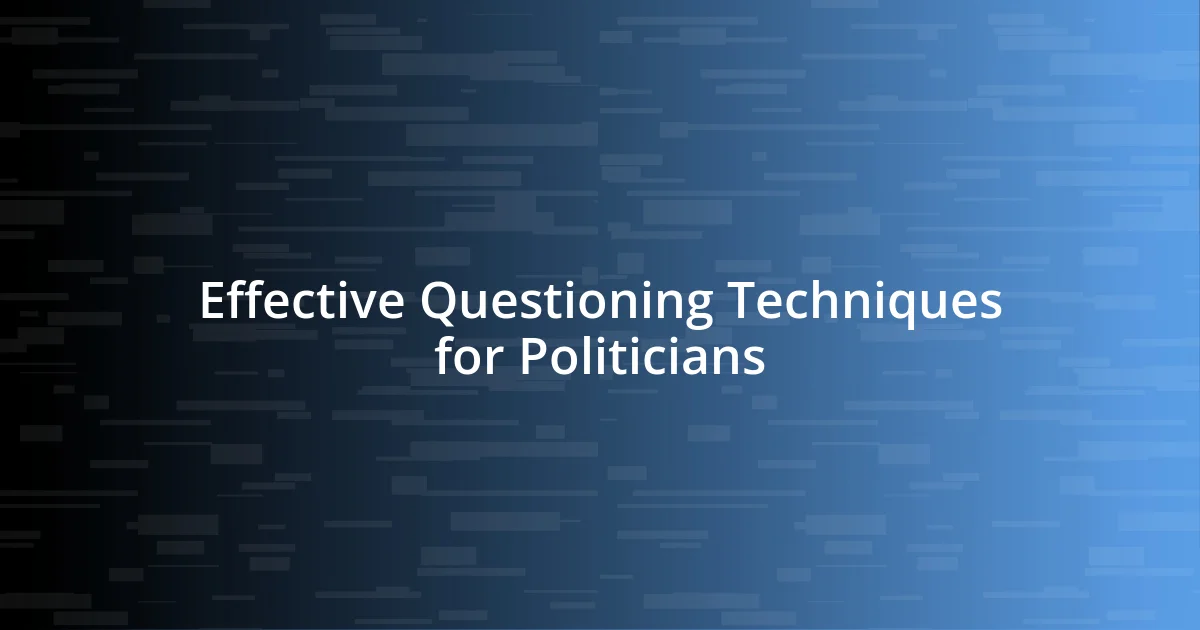
Effective Questioning Techniques for Politicians
When preparing to interview politicians, I’ve found that open-ended questions are invaluable. Instead of merely seeking yes or no answers, I’ve learned to frame inquiries that invite a narrative. For instance, asking, “What inspired you to pursue this policy?” leads to stories that paint a broader picture of their motivations and values. This technique not only fosters a deeper connection but often serves as a springboard for more insightful follow-up questions.
Another effective technique involves the use of hypothetical scenarios. When I challenged a politician with a question like, “If faced with a sudden budget cut, how would you prioritize spending?”, I was able to witness their problem-solving skills in action. It’s fascinating to observe how their responses reveal not only their strategic thinking but also their priorities. I believe this approach humanizes the conversation, moving it beyond abstract policies to real-world implications.
Lastly, balancing challenging questions with empathetic listening can yield rich insights. During one interview, I sensed the politician’s discomfort when discussing a controversial decision. By validating their feelings, I was able to ease the tension and create a space for honest dialogue. In moments like these, I learned that patience and empathy can unlock truths that statistics alone cannot convey.
| Question Type | Description |
|---|---|
| Open-Ended Questions | Encourage detailed responses that reveal motivations and stories. |
| Hypothetical Scenarios | Assess problem-solving skills and priorities through situational inquiries. |
| Empathetic Listening | Validates feelings and fosters honest dialogue, especially during uncomfortable topics. |
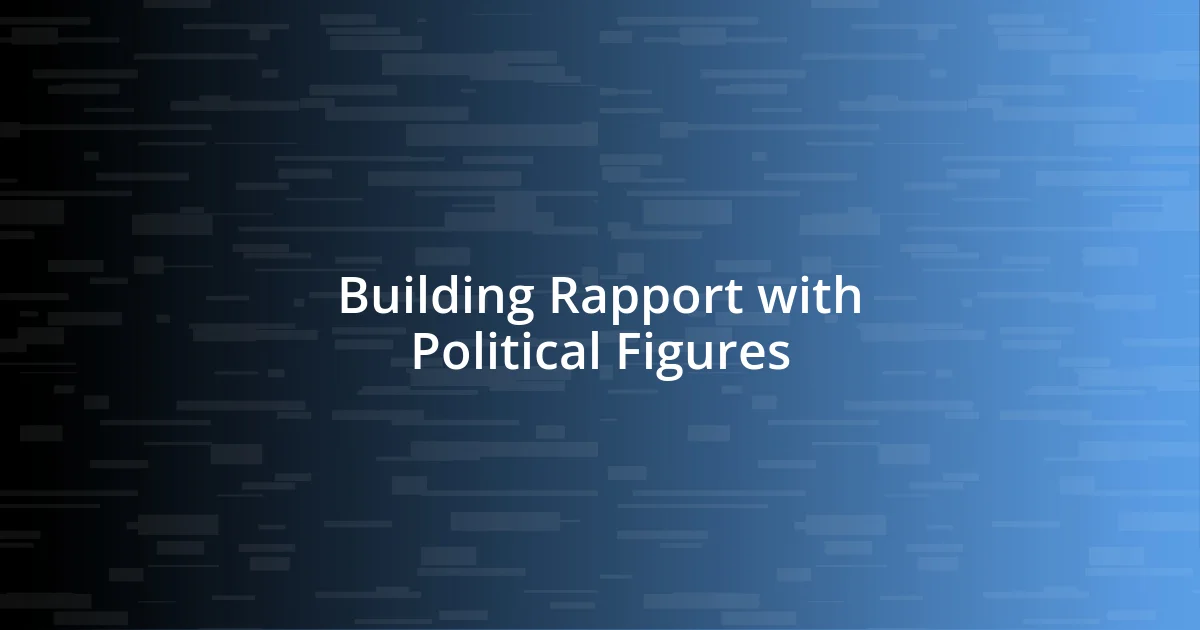
Building Rapport with Political Figures
Building rapport with political figures requires an authentic approach. I remember one interview where I made a genuine comment about a community event the politician had attended recently. It caught them off guard but immediately created a warm atmosphere. This simple gesture broke down the formal barriers and opened the door for a more honest exchange. Isn’t it interesting how a little effort to connect on a human level can transform the tone of the conversation?
Another crucial element in building rapport is finding common ground. During an interview about healthcare policy, I discovered that the politician shared my passion for improving mental health services. By expressing my experiences and thoughts on the topic, I saw their eyes light up. It felt as though we were not just discussing policy but genuinely collaborating on a shared mission. Isn’t it remarkable how mutual interests can elevate a dialogue from mere discussion to a powerful connection?
Lastly, I’ve learned that sincerity is key. In one memorable encounter, I candidly addressed a sensitive issue that was affecting their constituency. Instead of evading the topic, they appreciated my straightforwardness, which fostered a deep sense of trust. They even shared a personal story that highlighted their motivations behind their decisions. This honesty led to a fruitful discussion that felt like a two-way street, inviting a more nuanced understanding of their perspectives. Isn’t it fascinating how such moments can lead to significant insights for both parties?
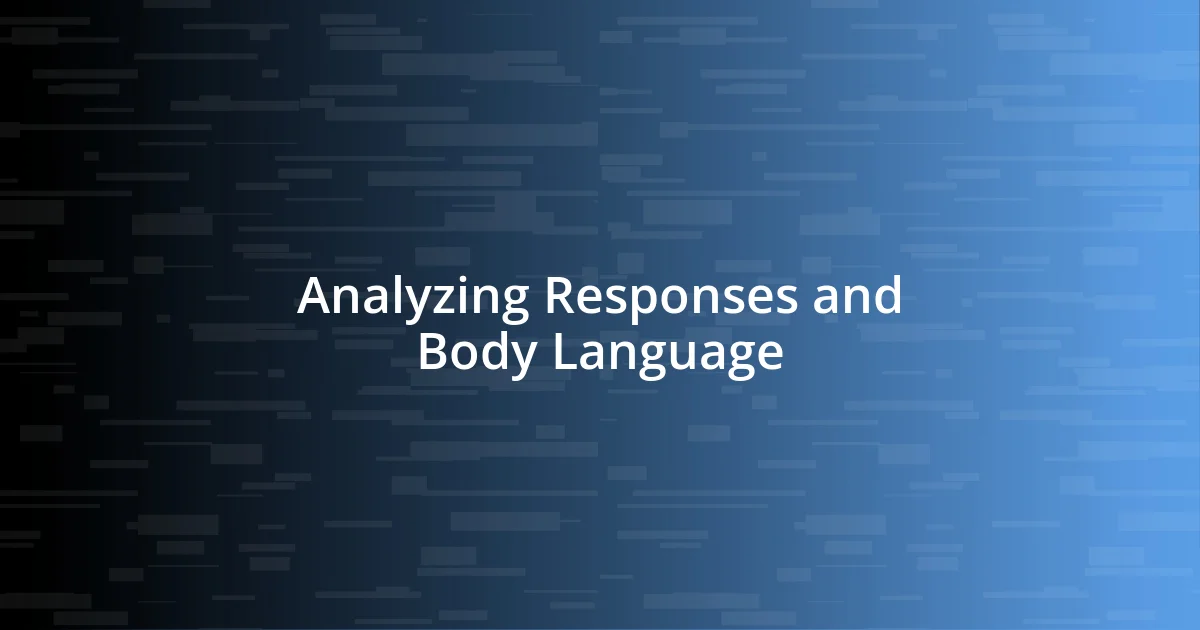
Analyzing Responses and Body Language
When interviewing politicians, I’ve learned to really pay attention to both their verbal responses and their body language. For instance, during one interview, I noticed a politician’s sudden change in posture when I asked about a controversial vote. It’s almost as if their body was speaking louder than their words. I find that subtle cues, like crossed arms or shifting eyes, can reveal discomfort or defensiveness, prompting me to dig deeper.
Analyzing their tone can also be telling. I recall a moment when a politician laughed off a serious question about accountability, projecting an air of confidence. However, the slight tremor in their voice hinted at underlying nervousness. Isn’t it fascinating how the combination of what’s said and how it’s said can unlock layers of meaning? This dual analysis has often guided my follow-up questions, leading to more genuine conversations.
I’ve come to appreciate the power of silence in interviews too. In one instance, after posing a challenging question, I consciously held my breath, allowing a pause to linger. The politician, unsure of how to respond, ultimately shared a heartfelt story that I didn’t anticipate. This taught me that silence can be a potent tool, inviting deeper reflection and often revealing more than we initially expect. Have you ever considered how a brief moment of quiet can transform the flow of a conversation? It really can be remarkable.
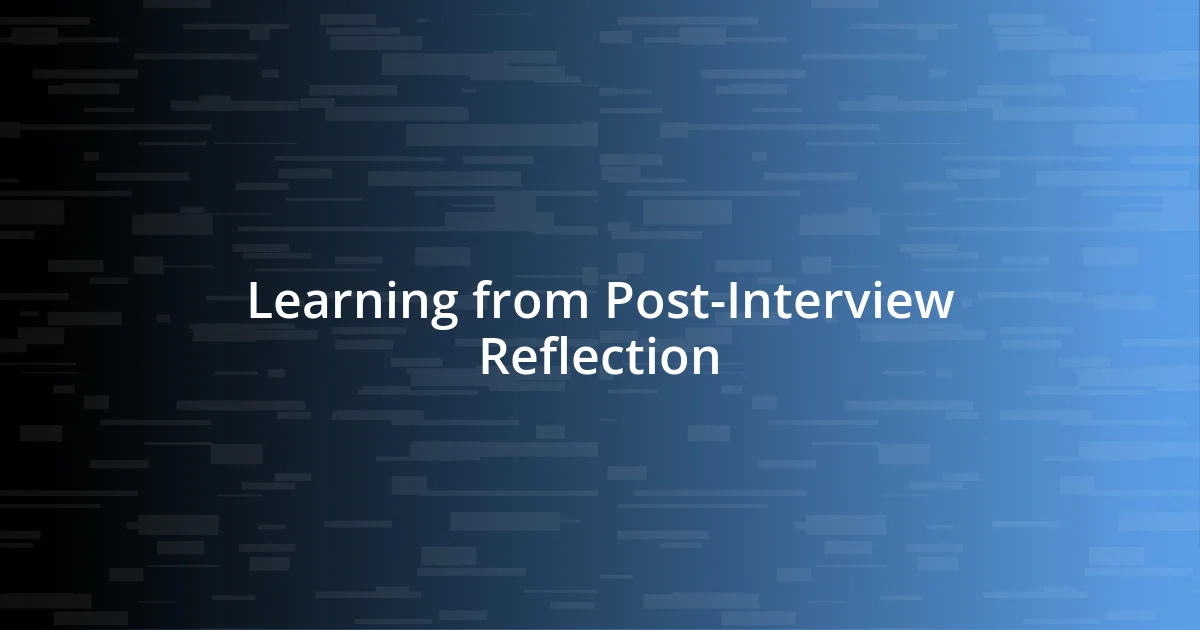
Learning from Post-Interview Reflection
Reflecting on interviews has been a transformative experience for me. After each discussion, I take a moment to jot down my thoughts. Sometimes, I find that the most valuable insights come from the questions I didn’t ask. For instance, there was an occasion when I realized too late that a follow-up about community funding could have unlocked more significant information. This has taught me the importance of remaining flexible and ready to explore deeper layers of conversation.
I’ve also learned about the significance of emotions during the reflection process. There was an interview that left me feeling both energized and puzzled. The politician spoke passionately about education reform, but their underlying frustration was evident. I later processed how emotional depth could often indicate a genuine commitment to the issues. This reflection helped me appreciate the nuances of their passion, leading me to ask more thoughtful questions in subsequent conversations.
Lastly, I think about the importance of evaluating my own performance post-interview. Did I listen actively? Did I lead with curiosity? I remember feeling embarrassed after one interview when I realized I had interrupted a story that could have deepened our connection. Evaluating my approach helps me cultivate a more authentic interviewing style that invites more meaningful exchanges in future encounters. Have you ever had a moment that made you rethink your approach? Those moments can be pivotal for personal growth and improvement.
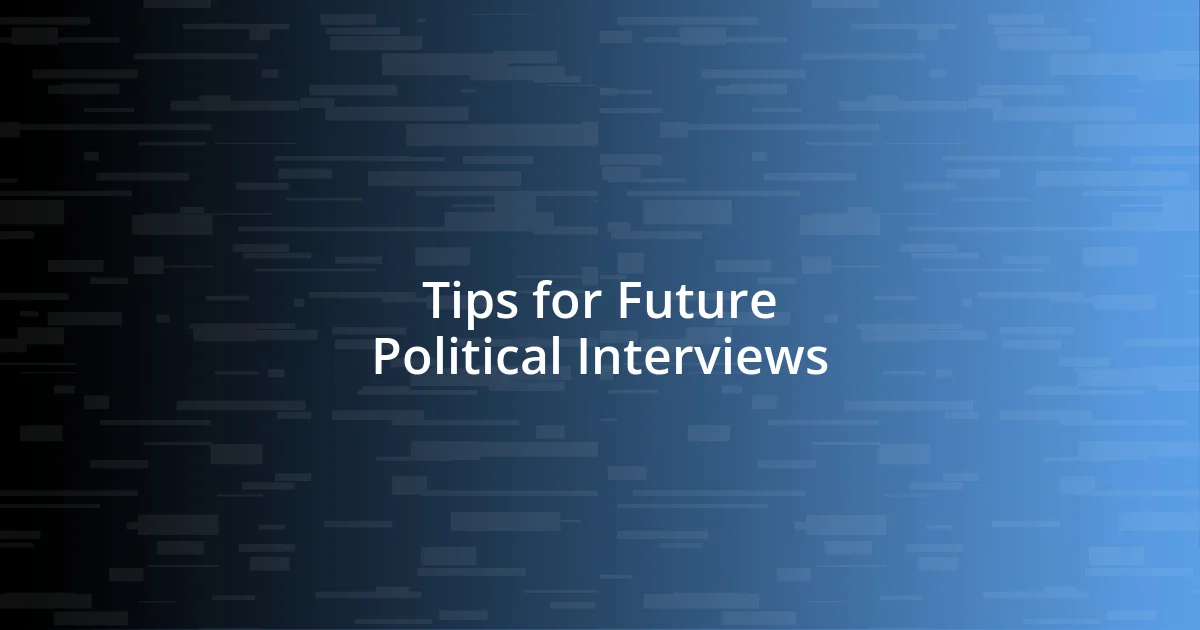
Tips for Future Political Interviews
The key to successful political interviews often lies in preparation. I once went into an interview having researched the politician’s previous statements and public reactions, which allowed me to ask more informed, impactful questions. It was during that conversation that I realized how a well-prepared approach not only helps in navigating complex topics but also builds a rapport with the interviewee. How can you expect to uncover genuine insights without a solid grasp of their history?
Asking open-ended questions has become one of my favorite techniques. I recall a moment when I posed a simple, broad question about community initiatives, allowing the politician to share their vision without constraints. The response was unexpected and rich in details, offering me a richer narrative than any closed question ever could. This experience made me appreciate the power of letting interviewees express themselves fully. Have you noticed how the right questions can lead to stories that resonate more with your audience?
Emotional intelligence plays a significant role during the interview process. In one instance, I noticed a slight crack in a politician’s voice when discussing a sensitive topic. It struck me how vulnerability can flip the script, inviting both empathy and authenticity into the conversation. I’ve since made it a point to create a safe space for openness, as I believe that when politicians feel secure, their true passion and motivations emerge more vividly. Have you ever thought about how fostering trust can redefine the dynamics of your interviews? It truly opens doors to deeper understanding and connection.




